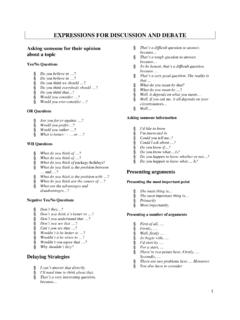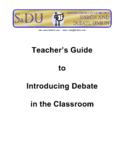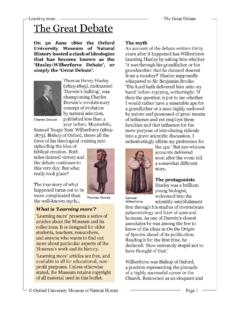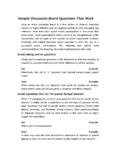Transcription of 50 Debate Prompts for Kids - eBookDestination.com
1 50 Debate Prompts for Kidsby Patrick Daley and Michael S. DahlieNew YorkTorontoLondonAucklandSydneyMexico CityNew DelhiHong KongSCHOLASTICBPROFESSIONAL OOKSR eady, Read, Debate ! .. 5 Using This Book .. 7 Using Debates to Build Vocabulary .. 8 Graphic Organizers .. 12 Debate animals be used to test new products? .. cell phones and beepers be allowed in class? .. disasters like the sinking of the Titanic,who should be saved first? .. beaches have rules? .. people be allowed to go barefoot anywhere they want? .. gun makers pay the cost of gun violence? .. people lose their jobs if it helps the environment? .. children be allowed to enter beauty pageants? .. student athletes have to get good grades to play sports?
2 Coats made with dog fur be against the law? .. boxing be banned? .. police belong in schools? .. hunting be banned as a sport? .. students get paid for attending school? .. you do the crime, should your parents do the time? .. teen criminals be locked up in adult prisons? .. you change the way you dress because of what other people might think? .. businesses be forced to deliver to every neighborhood? .. the government rate music? .. teen juries a good idea? .. space exploration worth the money we spend on it? .. 35 Table of ContentsTable of Contents (continued) you find $100, is it yours to keep? .. malls in America have banned teens. Is this fair? .. you see someone cheating on a test, should you tell?
3 Teen curfews a good thing? .. year-round school a good idea? .. skateboarding be banned in public places? .. Olympic athletes be tested for drugs? .. sports teams drop Native American names? .. celebrities be responsible for the products they endorse? .. schools have dress codes? .. celebrities speak out on political issues? .. kids have to address teachers as Ma am and Sir? .. laws be stricter for teenage drivers? .. the paparazzi be banned? .. teens have too much to do? .. you find a historical treasure, does it belong to you? .. surveillance cameras be used in schools? .. moshing be allowed at concerts? .. school newspapers be censored? .. paddling be used to punish students?
4 You give up certain luxuries to save the environment? .. students have to do volunteer work to graduate? .. schools named for slave owners be renamed? .. doctors transplant pigs organs into human bodies? .. male and female training in the military be separate? .. girls have their own schools? .. kids learn riflery in schools? .. the United States be the world s police force? .. teens have their own credit cards? .. 64 5 Not an ArgumentUnfortunately, many of us confuse debating with arguing. And no wonder! Our mostpublic displays of Debate political debates are rarely an exchange of ideas for thepurpose of refining one s thinking. Ideally, debating is an open-minded, intelligent wayto explore a world filled with diverse the classroom, you can best instruct about this type of Debate by regularly modelingit, making sure to demonstrate your willingness to change your opinions as you gathernew information.
5 For a simple Debate exercise, you can complete the five-step process inminutes. A more elaborate or complex Debate may extend for teaches students how to investigate new ideas and develop criticalthinking skills, and opens their minds to different , Read, Debate !Using Debates in the ClassroomOnce considered the stuff of elite high schools, debates are finding their way into class-rooms at all grade levels. And for good reason. The debating process teaches studentshow to investigate new ideas, helps them develop critical thinking skills, and opens theirminds to different , when working with students, there are five steps to the debating processthat you will want to reinforce and model.
6 Those steps are as follows:FormForm an initial opinionDefendDefend the position in a debateRefineRefine opinion through knowledge gained in the debateExploreExplore all sides of an issueGatherGather information 6Of course in this book you will find many debates which will spark new ideas and chal-lenge existing viewpoints. But before you even consult the pages in this book, you canhelp students better prepare for debating just by turning to the books they are reading ..or have read long a warm-up, bring out the children s classic,Make Way for Ducklings. (Yes, even yoursophisticated middle-schoolers will see the debating value of this picture book when youare finished.) Read the book aloud to students to refresh their memory of the tale.
7 Thenintroduce the Debate question, Should Mike have stopped the traffic to let the ducklingscross the street? Instead of having students immediately vote yes or no, focus on exploring the differ-ent sides of this question. (NOTE: It is extremely important for you to show that you arealways more interested in the process of forming an opinion than you are in the opinionitself.) Why might someone say that Mike was right? Why might others think he waswrong? Have students revisit the story to seek further information and clarification. Werethere stop signs or traffic lights on the street? How fast were the cars going? Were there,in fact, many cars on the street?Point out to students that they can look to most of the books they are reading indepen-dently for good Debate questions.
8 And by the middle grades, students are capable of tak-ing each step to a deeper as an example the book Spirit Questby Susan Sharpe. In this book, a youngNative American boy discovers more about his rich ancestry. Within the book thereare tons of debatable issues. But a real-world Debate topic (which is found later in thisbook) is Should sports teams drop Native American names? This Debate takes on awhole new significance when viewed through the eyes of William the protagonist inSpirit Reading ConnectionJust ImagineCritical thinking, thoughtful discussion, and informed, flexible opinions. What agreat process to teach students. What a great literacy skill to give our future community leaders!
9 7 Whole-Class DiscussionYou may simply pass out a Debate and ask students to read the Debate issue bothsides and then discuss in class. However, for a richer experience you may want to preview the Debate topic by just reading the title aloud. Then students can fill out thefirst part of the Before and After graphic organizer found on page 13. This will allowstudents to see how their opinion might change as they gather more ReadingRemember that you, the teacher, are the most valuable resource for modeling how onegoes about forming an opinion. To best do this, pass out a copy of a Debate to each student. As you read the Debate to the students, use several think alouds to show howyour opinion is forming.
10 Interjecting comments such as Oh, I never thought of that. Or That s something I never thought of before. This shows that you are an active,engaged and/or Paired ReadingThere are times when you may want your students to work on the debates independent-ly. This option allows students to practice their opinion-forming skills and strategiesfrom time to time. In paired readings students can work together (in pairs) to help eachother through the opinion-forming process. In either case, you may wish to have themexpress their points of view in one or more of the following ways: Discussion: Tell students to be prepared to share their opinion about the topic. Writing: Debates naturally act as Prompts for students to craft a written point of students to clearly identify the reasons that have helped them form theirown opinion.






